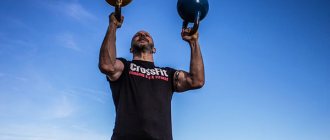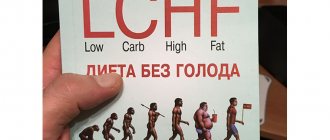| |
Author: Mikhail Ziborov
— author of the website makefitness.pro. Date: 2020-11-11
All articles by the author >
We will talk about training in general: about cardio training (aerobic exercise) and strength training (anaerobic exercise). Let's consider both cases: is it possible to train on an empty stomach for cardio and for strength training?
From the material you will learn:
1. Disadvantages of training on an empty stomach. 2. Positive aspects of training on an empty stomach.
Which is better?
How do you prefer to train? On an empty stomach or after a solid meal? I personally am only able to move in the early morning, before breakfast. Many people, on the contrary, can function normally only by eating heavily.
The debate about the best way to exercise will probably never go away. Fans of exercise on an empty stomach are squabbling with those who like to snack one more time, and it seems that the truth is still far from true. Today we will try to give a definitive answer to the question of how to exercise most effectively.
Workouts for weight loss and in the morning on an empty stomach
A special case is early morning workouts and weight loss exercises.
When gaining muscle mass, a light breakfast before your morning workout is still advisable.
A banana, muesli or oatmeal, half a serving of water gainer, etc. will do.
If you train too early, sometimes you don’t have an appetite, even to have breakfast. If this is your case, so be it. But it’s better not to delay eating after a morning strength training session.
By exercising on an empty stomach, you accelerate muscle catabolism (the breakdown of muscle tissue) to the maximum. This process must be stopped by eating as quickly as possible.
If you are training to lose weight, you can skip breakfast before training.
Due to prolonged fasting after sleep, glycogen reserves (which are spent first) are already running low, which means that the likelihood of greater fat consumption during training increases.
However, if muscle mass is still important, we recommend not to practice high-intensity exercise in the morning, since amino acids from the muscles will be consumed along with fat.
It's time to debunk old myths about food and exercise.
It is, of course, difficult to give a definitive answer. Everyone is different, and everyone achieves the best training results in different conditions. Telling a person how he should exercise is kind of like telling him what time of day to work out or what diet to follow. Everything is too individual. But there are a number of myths that people continue to believe.
Contrary to popular belief, research shows that snacking throughout the day does not speed up your metabolism, skipping meals will not automatically make you fat, and exercising on an empty stomach will not invalidate your workout results. In reality, intermittent meal skipping, also known as intermittent fasting, the alternative nutrition diet, or the longevity diet, can be pretty damn beneficial.
So let's start with the good. For example, because he's handsome
, preparing for his next role as Wolverine, practiced intermittent fasting in order to build muscle mass. Why did he choose this particular diet? The fact is that it triggers a chain of hormonal changes that are beneficial both for building muscle mass and for burning excess calories.
The benefits of training on an empty stomach
Scientists are increasingly inclined to believe that, thanks to our “thrifty” genes, low levels of muscle glycogen during exercise stimulate certain metabolic processes in the body and improve muscle adaptation to physical activity. Studies have shown that training on an empty stomach not only improves aerobic endurance, but also promotes increased fat burning compared to training in a high muscle glycogen environment.3,4 Therefore, if you are looking to get lean through aerobic exercise, e.g. treadmill or exercise bike, then morning workouts on an empty stomach will lead to the desired result as quickly as possible.
Exercising on an empty stomach has two significant benefits
Increases sensitivity to insulin
Let's talk very simply. When we eat, the body produces insulin to help absorb nutrients. The hormone then redirects sugar from the blood to the liver, muscles and subcutaneous fat to be used for energy later. The problem is that the habit of eating too much and too often makes us more resistant to insulin, that is, it reduces sensitivity. In medical practice this is called insulin resistance. Low insulin sensitivity increases the risk of cardiovascular disease and cancer, and also makes it much more difficult to lose weight. In short, it interferes with life with terrible force.
Reducing the frequency of your meals is a good way to address insulin resistance. The body produces insulin less frequently and, accordingly, becomes more sensitive to it. Blood flow to the muscles improves, it becomes easier for us to lose weight, and the effects of an unhealthy diet are curbed.
Action of the hormone somatotropin
Somatotropin is an almost magical elixir of youth that helps the body build muscle tissue, burn fat, strengthen bone tissue, improve physical function and prolong longevity.
Along with regular exercise and good sleep, light fasting is the best way to increase growth hormone levels in the body.
One study found that after 24 hours of fasting, growth hormone levels in men increased by as much as 2,000%, and in women by 1,300%! The effect wears off quickly, so there are good reasons to fast regularly in order to constantly maintain the level of somatotropin, which has such a wonderful effect on our body.
Fasting and sports
When talking about beneficial hormones, we cannot ignore testosterone. It helps increase muscle mass and reduce body fat. In addition, it increases the level of physical strength, energy and libido, helps in the fight against depression and heart problems in both men and women. Fasting itself has no effect on testosterone. But there is an amazing way to force the body to produce more testosterone and growth hormone at the same time, thereby creating ideal conditions for building muscle mass and burning fat: fasting + active sports!
Exercise, especially intense exercise that targets multiple muscle groups (compound exercises like barbell squats), causes large spikes in testosterone. This is why it is useful to combine exercise and fasting. Numerous studies have shown that working out while fasting is a great way to build muscle and improve insulin sensitivity. This approach is effective not only because of hormonal reactions, but also because it helps the body absorb nutrients from food much more actively.
In short, exercise on an empty stomach helps proteins, fats and carbohydrates to be stored as fatty tissue in the smallest quantities. It has been found that people who actively exercise while fasting lose weight at a much greater rate (possibly due to increased levels of oxidative enzymes).
Such training teaches your body to use energy more efficiently and not waste it, and increases the efficiency of glycogen storage in the muscles. Periodic “fast training” further improves the quality of regular ones. Some studies have also shown that "fast training" can significantly improve athletes' endurance, which is measured by the ability to take in and use oxygen during exercise, and is a pretty smart way to measure exercise.
Disadvantages of Fasted Training
May cause fatigue
There is a chance that fasting before a cardio workout may reduce the duration of your workout due to fatigue. And also very quickly reduce your motivation. But again, it all comes down to individual preference.
Overall, the effects of fasting on physical performance remain unclear, with some studies reporting decreased performance, some reporting increased endurance, and others reporting no significant correlation or effects.
If you wake up early in the morning to exercise after a good night's sleep, you may have a lot of energy even without eating. However, if you exercise later in the morning on an empty stomach, after you've already been on your feet for several hours, fatigue can become an issue. So it looks like it depends on your unique exercise schedule, body type, and other factors.
May lead to weakness
Some scientists believe that fasting before cardio exercise causes side effects such as dizziness and low blood sugar
. You may find that you are unable to motivate yourself to exercise actively when you have been fasting because you feel weak, in which case you will begin to decrease your physical performance.
For example, one study found that “...overnight fasting reduces exercise intensity and volume during sprint interval training but improves high-intensity aerobic endurance.” ()
Another meta-analysis found results suggesting that eating before exercise increased the intensity and duration of aerobic exercise, but had no effect on shorter exercise sessions. ()
May promote muscle breakdown
Although we mainly talked about aerobic
training on an empty stomach, it is still important to note that exercising on an empty stomach can negatively impact muscle growth and strength.
Some studies have shown that training in a fasted state causes muscle tissue to be broken down for energy.
, making it difficult to build muscle mass and build strength and endurance.
So if you're involved in bodybuilding, cross-training, and weight lifting, there's a chance that fasted aerobic training will interfere with your results.
Not everything is rosy, of course.
It would be dishonest to gloss over the fact that not everything is rosy. Some studies have shown that exercising while fasting results in impaired performance. True, they studied mainly such traditional fasts as Ramadan, which does not allow the consumption of liquids (which is not recommended for athletes). Even the fact that most people eat before playing sports already suggests that sports after eating already gives good results. Heck, there are even studies that show that eating before workouts can lead to fewer calories consumed throughout the day. But all this does not in any way cancel the undeniable benefits of periodic training on an empty stomach.
So, if you want to try working out on an empty stomach. ↓
Arguments AGAINST training on an empty stomach
1. Fat burning does not accelerate
. Yes, lipolysis (the release of fatty acids from subcutaneous fat) increases. But the body is simply not able to burn this entire volume of released fatty acids. Therefore, unburned fatty acids return back under the skin after training.
2. Exercising on an empty stomach in the morning makes things worse.
. Morning is the period when the hormone cortisol rises (its high level). It would be logical to assume that it will help us lose more fat. And my stomach is empty! Fat burning should be greatest. But in fact, it turns out that cortisol stimulates the storage of fat in the belly! For understanding, let's express this in numbers.
Let’s say that when you burn fat, 100 fatty acids are split off from your subcutaneous fat. The body cannot burn all 100. Or maybe only 80. Where will the remaining 20 go? Will be deposited on the stomach! Those. in all other places you will lose weight, but your stomach will not. All this looks very strange, but this is evidenced by material from an authoritative source with scientific research: https://cmtscience.ru/article/kardio-na-golodnyj-zheludok-i-zhiroszhiganie
I wrote about other functions of cortisol, in addition to catabolic ones, in this article.
3. When training in a fasted state, you lose a little muscle mass.
. It's simple: the body needs amino acids (protein components) to maintain their normal volume in the blood (amino acid pool). The amino acid pool is consumed during training (not all, but partially). Where can the body get amino acids if you haven't eaten? There is only one source - muscles. This is called muscle catabolism (destruction of muscle tissue). And if you then do not give your body protein in excess, then this loss will not be replenished. Research material confirming my words: https://cmtscience.ru/article/pro-nezasluzhennuyu-horoshuyu-reputaciyu-kardio-natoschak
A small conclusion: you don’t have to worry about losing muscle mass if you give your body plenty of protein after training and throughout the day.
4. Fasted training on a regular basis will begin to burn even more muscle over time.
At some point, the body will begin to use amino acids from the muscles even more, and the loss of muscle tissue will increase. This occurs when muscle glycogen is reduced to 50% due to lack of carbohydrates. Glycogen is the source of energy in the body. If the energy sags greatly, the body begins to receive it by breaking down the muscles. Confirmation in the same material: https://cmtscience.ru/article/pro-nezasluzhennuyu-horoshuyu-reputaciyu-kardio-natoschak
Action plan
We understand perfectly what you are thinking right now. Something like this: “Screw it, I won’t be able to withstand the stress without eating anything!” First, let's have a little more faith in ourselves. You can do much more than you think, you just need to arm yourself with the right attitude. Secondly, we will give some simple tips that will help you master this diet more painlessly:
- You can drink more than just water. Don't be afraid to break your old habits and get energy from black coffee, tea, caffeine tablets, creatine and other non-caloric substances.
- Stop fasting whenever you feel like it. Many people prefer to eat immediately after training, after a short fast has already had its effect. It doesn't make much difference if you extend your fast. Even if you exercise in the morning and don't eat until the evening, the wave of hormonal changes will last throughout the day and prevent muscle loss. No matter what you decide, your body will always support you.
- Eat as much as you want. Notice we didn't say "eat as many calories as you want." After all, it is not at all necessary to eat a lot of food.
And finally
The habit of eating is probably the most durable human habit. We are all people, we are all human, our habits are us. Fighting the habit of constantly eating something is a noble, but thankless task. This is terribly difficult, especially for those people who have spent N amount of time learning to eat regularly and at the same time. It's true: Intermittent fasting takes time to get used to. Our body must get used to the fact that it will not receive food as often as before. This uncomfortable feeling goes away over time, but if you feel that this way of eating is not for you, then there is no need to continue. Just don't be afraid to try.
Hunger prevents us from seeing the future
The research technique consisted of asking participants questions related to food, money or other rewards. The interviews were conducted twice. Once - after a regular meal, and again - on a day when they did not eat anything.
It turned out that people in a fed and hungry state gave different answers. Hunger made them more impatient, prompting them to agree to a small but quick reward, refusing the one promised at a later date.
It wasn't surprising that hungry people would accept smaller food rewards if they didn't have to wait long, but the scientists found that fasting also changed preferences for rewards that weren't food related at all.
It turned out that the reluctance to delay gratification may well transfer, for example, to decisions in the field of finances or interpersonal relationships.
Let's say you are offered to get something now or wait and get it twice as long. How long are you willing to wait to get double the results? A study from the University of Dundee says 35 days. But if a person is hungry, the maximum he is willing to wait is 3 days. And this approaching horizon is characteristic of all decisions, including those that have nothing to do with satisfying hunger.










